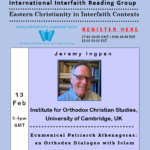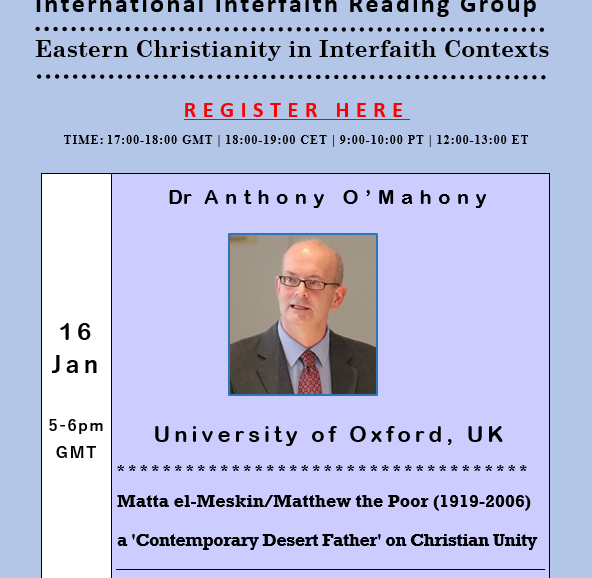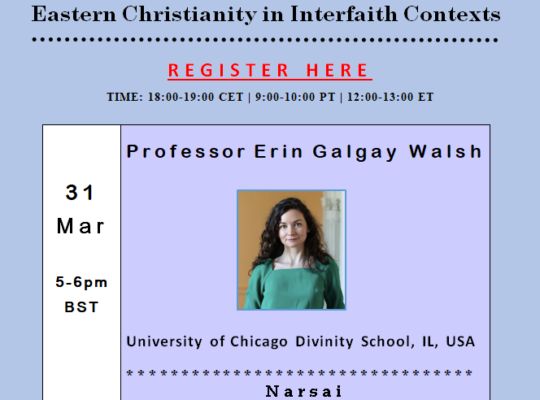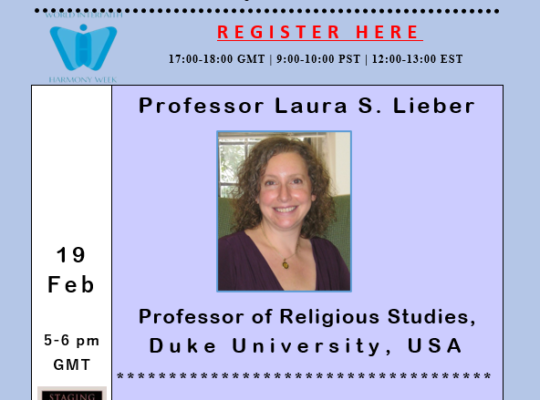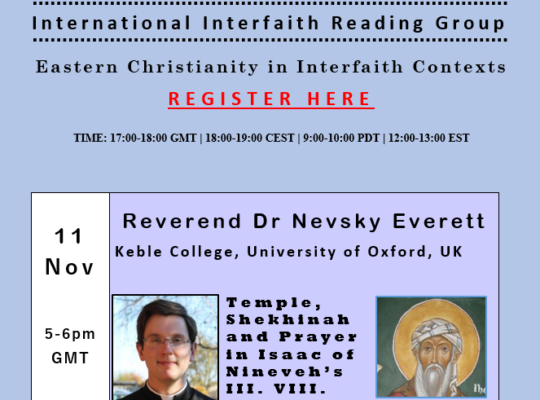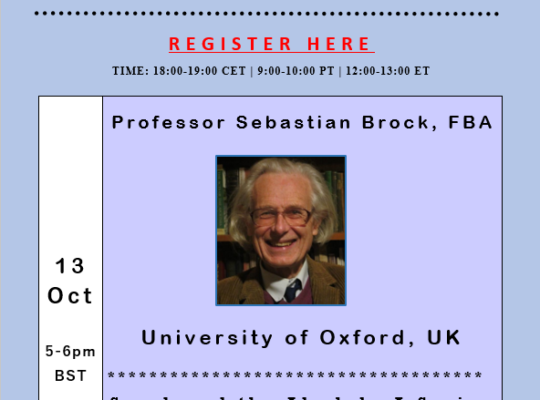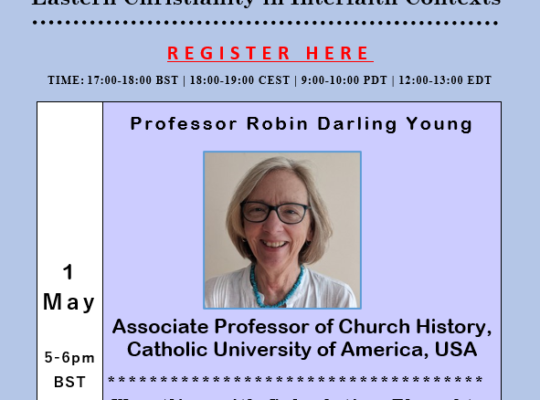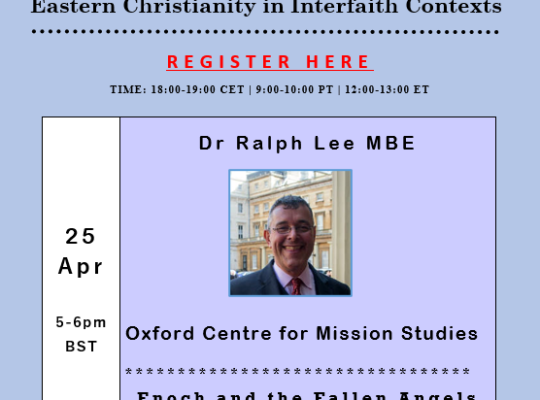16 January
We are deeply honoured to welcome Dr Anthony O’ Mahony, University of Oxford, UK, to lead a session of the Eastern Christianity in Interfaith Contexts Reading Group.
Here are the details of this fascinating session.
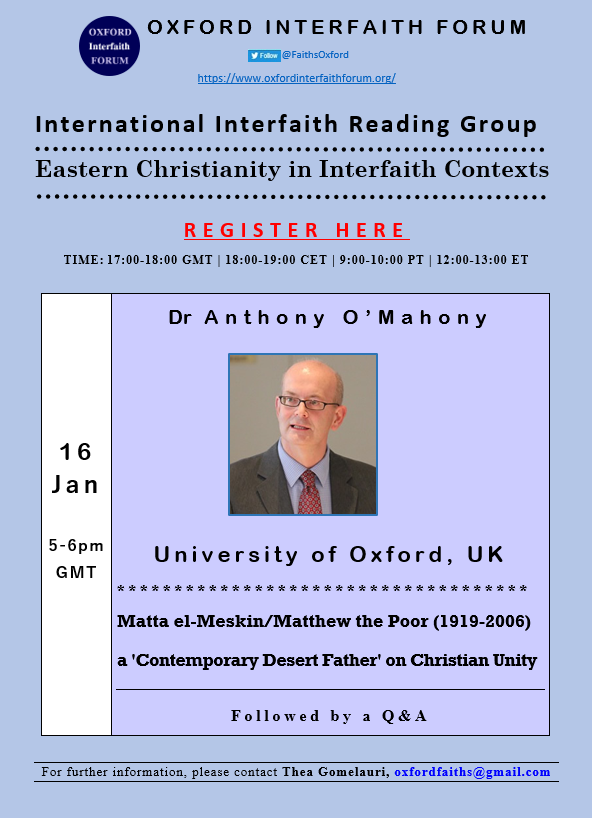
Topic: Matta el-Meskin/Matthew the Poor (1919-2006): a ‘Contemporary Desert Father’ on Christian Unity
Abstract: The Egyptian Desert Fathers have had a strong and long hold on the religious imagination of the West; this interest has recently been revived by the monastic renewal in the contemporary Coptic Church. Samuel Rubenson has stated “Egypt is not only the land of Christian monastic origins, but also of modern monastic revival.”The renewal in the Coptic Church is a product of the wide range of forces, but has been identified above all with significant individuals who personified the monastic spirituality and leadership which is at the heart of this movement—Patriarch Cyril VI (1902-1971), Patriarch Shenouda III (1971 -2012) and the monk Matta el Meskin (1919-2006). The two monks who became patriarchs gave institutional strength, structure and meaning to the monastic renewal. Edward Watkin observed in his appraisal of Cyril VI: ‘Not only has a monk become a patriarch, but the Patriarch has remained a monk.’ The third,Matta el Meskin was not only a spiritual author, he is also the corner-stone of the extraordinary renewal of the monastery of St Macarius in Wadi el-Natroun, in the Scete Desert; he is a major figure in the monastic renewal which the Coptic Orthodox Church has been undergoing since the 1950s. Matta el Meskin’s radical focus upon personal faith and monastic enclosures stands in often contrast to the institutional religion and ecclesiastical authority. That said, Matta el Meskin was an ecclesial person – a singular figure in the modern renewal and revival of the Coptic Church. ‘All authentic service begins and ends with the Church … has for its aim to link Christ and the community’ (Matta el-Meskeen). The monastic revival has been sourced in the desert tradition itself, where radical hermits began to attract disciples. Fadel Sidarouss, has well-described the character of the Coptic Church: ‘The contemporary Coptic Orthodox anthropology draws its resources from the first centuries of the Christian era. Its sociohistorical foundations reveal: an Apostolic Church, founded, according to tradition, by the Evangelist Mark; a Johannine theology, namely the descending theology of the School of Alexandria; a history of martyrs and minority, all along its history, from the time of the Romans till today; a national Christendom, fundamentally linked with the history of Egypt; finally a unique monastic spirituality, founded by Antony, Pacome, Shenouda. Matta el Meskin was determined that communal and solitary forms of Coptic Orthodox monasticism should exist in tandem, but he also taught the most compelling development of the monastic vocation for him was to be found in the solitary life. How are we to understand the life and spirituality of Matta el Meskin – this monk, who represented the great outpouring of the spirit, lived through his monastic vocation, as part of the confluence of forces which have transformed the Coptic Church? The spirituality of Matta el-Meskin today has not only influenced the wider Christian tradition but has taken root in the heart of readers in the world and the monastic enclosure. John Watson states, ‘During the last few decades, a small number of monastics—Catholic, Orthodox and Protestant—have made a significant impact upon many churches and other world religions. The Trappist Thomas Merton of Kentucky, the Russian Orthodox Seraphim Rose of Alaska, the Protestant Roger Shutz of Taizé, and the Benedictine Bede Griffiths of Shantivanam in southern India were all prolific authors. All four of them were also readers of the renowned Coptic (Egyptian) Orthodox monk Father Matta El Meskeeen (Mathew the Poor),’. [John H. Watson, `Fr Matta el Meskeen: Radical Coptic Orthodox Monk’, The Independent, 27 June 2006.]
Speaker: Dr Anthony O’Mahony, University of Oxford, UK
Chair: Professor Sebastian Brock, FBA, University of Oxford, UK
Time: 17:00-18:00 GMT | 9:00-10:00 PST | 12:00-13:00 EST
Venue: Online
After registering, you will receive a Zoom email containing information about joining the meeting. If you do not see the Zoom email in your inbox, please, check your spam folder.
If you would like to join the Eastern Christianity in Interfaith Contexts Reading Group, please sign up here.
Related Sessions
- The Manuscript Project at the Coptic Monastery of St Paul the Hermit at the Red Sea, Egypt
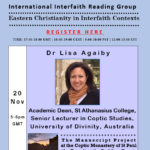
- A Jew Reads the Gospels in Syriac: Azariah de Rossi’s Critique of the Vulgate (1577)
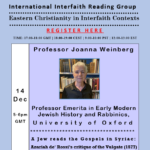
- Setting the Stage: The Rose of Performance in Studying Late Ancient Hymnody
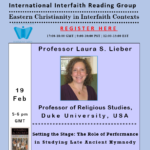
- The Miracle of Pilgrimage: A Coptic Journey to the Holy Land During the Ottoman Period
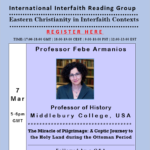
- Nikos Kazantzakis and Orthodox Christianity
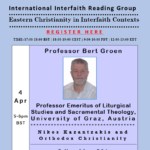
- Ephrem the Syrian and a New Beginning in Syriac Poetry
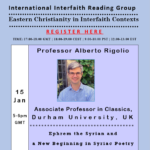
- Mary’s Ordeal: A Syriac Narrative Poem on Many and Joseph
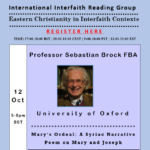
- Resurrection of the Human Body according to John of Dara’s Mimro I:4
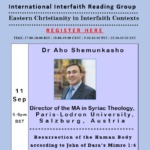
- Returning the Ticket: God and Evil in the Brothers Karamazov
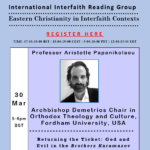
- Signs of Miraculousness: The Inimitability of Jacob of Serugh’s Teaching
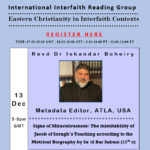
- Gregory of Nyssa: On the Human Image of God
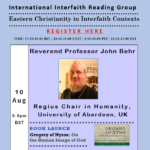
- Enoch and the Fallen Angels in the Ethiopian Tradition
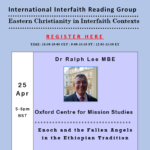
- Narsai on the Virgin Mary
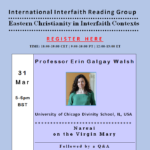
- ‘Conception by ear’ and Redemption of the Human Sensorium in Ephrem’s Thirty-fifth Madrasha on the Church
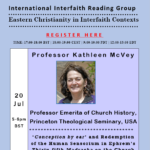
- From Edessa to South Arabia and Back: The Syriac Story of Bishop Paul and Priest John and Models of Sanctity in the Medieval Middle East
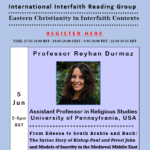
- Wrestling with Calculating-Thoughts: Mental Training according to Evagrius of Pontus
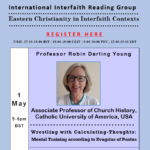
- An Anonymous Syriac Dialogue between Mary and the Angel
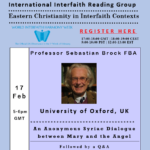
- Dadisho of Qatar: Questioning the Desert Fathers
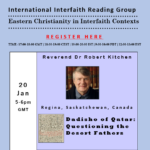
- George the Athonite on Matters of Faith and Rite, According to the Life of St George the Hagiorite
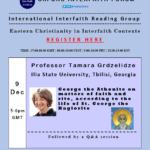
- Temple, Shekhinah and Prayer in Isaac of Nineveh’s III.VIII
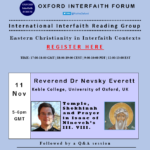
- St. Ephrem’s Commentary on Genesis Ch.3
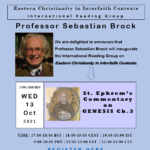
- 🕯️Alexander Schmemann on Theotokos vis-à-vis Kali a Hindu Mother Goddess
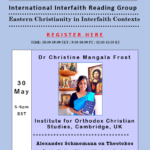
- The Opening Prayers of Saint Gregory of Narek’s Book of Lamentations
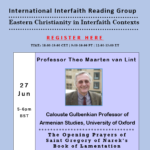
- Commemorating the saints at Turfan: Mart Shir and Mar Barshabba
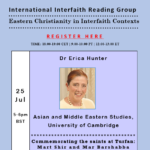
- Jacob of Sarug on the Canaanite Woman (Mt 15:21-28, Mk 7:24-30): Biblical Storytelling and Models of Faith
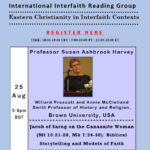
- The Paterik of the Kyivan Caves Monastery: Monk Polikarp in Discourse 14
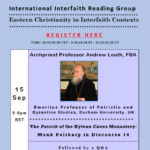
- Sarah and the Akedah: a Syriac Narrative Poem on Genesis 22
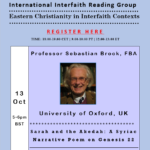
- Matta el-Meskin/Matthew the Poor: a ‘Contemporary Desert Father’ on Christian Unity
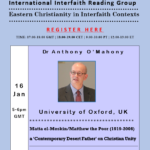
- Epistolary Style in Coptic Letters from the Late Third Century to the Early Fifth Century
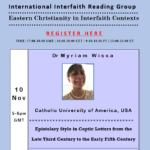
- Ecumenical Patriarch Athenagoras: an Orthodox Dialogue with Islam
